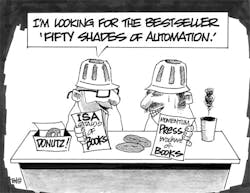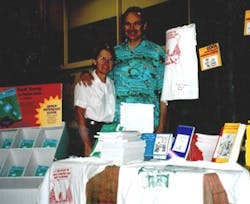Stan: Tell us how you got started in process control?
Read Also: Where are our control engineer heroes?
Flávio: I have a bachelor's degree in chemical engineering. I worked for 13 years as process engineer in chemical companies in Brazil (Rohm & Haas and Monsanto). Between 2008 and 2010, I was a process engineer for the DCS migration project at Monsanto facilities in Brazil. I was in charge of checking and redesigning all control logics in order to improve plant efficiency and productivity, to make the processes more automated, and simplify operations. Soon after the project completion, I was invited to assume the process control area for the site, and since then, I've been working as a technologist specialist in process control. My job is fun, and I have opportunity to implement smart control strategies to achieve savings.
Héctor: I started in college studying electrical engineering. After the first semester I became aware of control engineering. I got pulled in by the idea of automating machines. The brochure back then showed a robotic arm, making it more interesting. Needless to say, I changed direction.
Greg: Does being a process engineer help in being an innovative process control engineer?
Héctor: Absolutely. It helps you see the inner nature of things, and understanding what needs to be done. It helps you making decisions as you wear your control engineer hat. The process engineer comes up with an improvement idea, and the control engineer will make it happen. You will normally see them both in the control room or in field learning and working together. I have seen excellent control engineers not going any further and claiming, "That's a decision of the process engineer. That's not my call," and waiting until someone makes the decision. On the other hand, I've seen brilliant process engineers' hands tied by the lack of configuration and control skills.
Flávio: I consider it a great experience for process control professionals to have a short assignment as a process engineer. Process expertise is the key for innovation. My background in the process area is very useful, and brings value to the company. I'm able to identify opportunities to improve process safety and operations to reduce variability and costs.
Read Also: What women engineers want
Stan: Do you need configuration skills?
Héctor: Definitely. A process engineer is driven by the need to improve things, and is many times slowed down by the one with configuration skills. Having the configuration skills facilitates the improvement process, and makes it happen faster.
Flávio: I learned a lot about control systems configuration during on-the-job training, especially during the DCS migration project. I also consider training to be very important on the technologies available at your facilities to supplement the knowledge of control systems. The point is to understand the theory behind the screens in order to optimize the configuration, and meet process requirements. It can be done by creating control module classes and/or configuration standards.
Greg: What skills does a process control engineer need?
Flávio: The main technical skills should include DCS and PLC hardware and configuration, control networks and communication protocols, process data integration, alarm management, instrumentation, process safety and critical operations. Besides this, leadership, initiative, innovation and teamwork are essential to have a solid career and recognition.
Héctor: You need to be able to talk to people and get along with them, especially the operators. They're the ones working with the process on a day-to- day basis. They know when the process is behaving well and when there is an abnormal situation. You must clearly communicate results linking them to key indicators, such as unit cost energy costs, etc. You need to be capable of analyzing data sets and making correlations, and making reports and presentations. You must go to the field. Many times you'll be banging your head in front of your control system screen adjusting gains and wondering why the PID is not working when something is wrong in the field. Is a manual valve closed? Has a rupture disk failed? Is the final control element installed? (Just joking.)
Stan: What have been some of your main accomplishments?
Flávio: I have three main projects I consider the top ones in terms of business delivery. In the first one, we implemented a model predictive control strategy to reduce steam usage in the plant, achieving significant savings and avoiding investments in a new boiler. The second project used an innovative temperature control strategy for a batch reactor that reduced the main raw material usage, achieving significant savings. The third one involved the complete redesign of operation logics for a continuous plant, which significantly increased the plant's productivity and delivered extra finished goods volume to Brazilian markets.
Héctor: I've remotely assisted sister plants worldwide with consulting and sharing of best practices; successfully led the process control area in an accelerated schedule for a major capital project in Mexico; improved the structure of a batch temperature controller eliminating overshoot; and became part of Solutia's Advance Interlayer Worldwide Engineering Group.
Greg: What are some of secrets to your success?
Héctor: I seek to always deliver more than expected. If I'm supporting trials on site at other plants, I'm not only looking into my specific commitment. I try looking into other things to improve, wearing always both my control and process engineering hats. If someone needs help, I help. If they do not ask for help, I volunteer. I step up.
Flávio: I involve the right people at the right time and deliver the "product," accomplishing the customer needs (in terms of costs, quality, safety, deadlines and benefits).
Greg: Flávio and Héctor will be working with Jack Ahlers and Greg McMillan on a new book tentatively titled Batch Process Control Improvement—Solutions to Increase Capacity and Efficiency.








